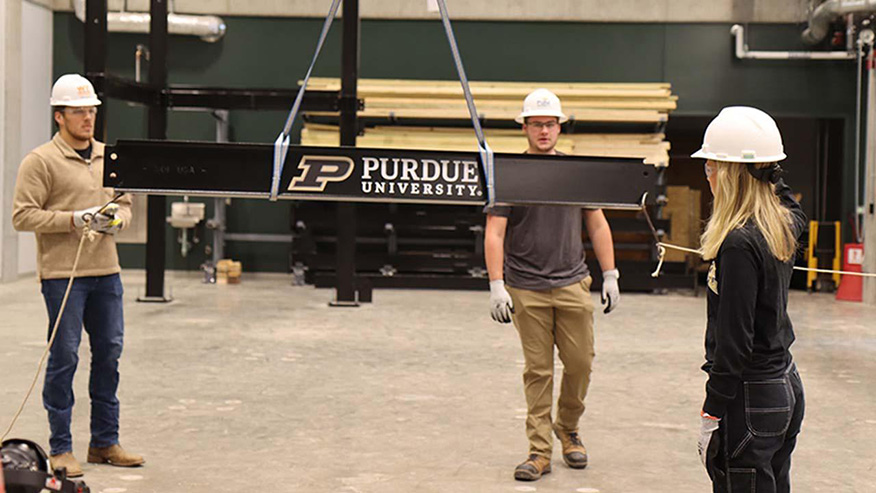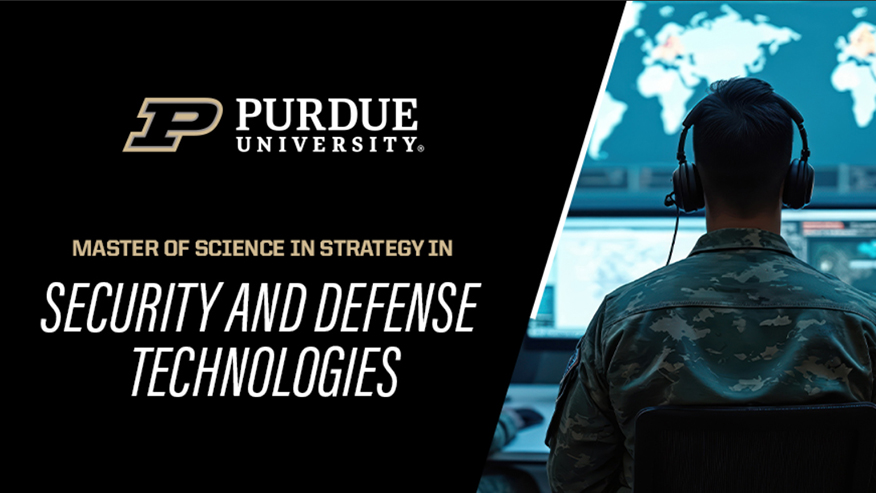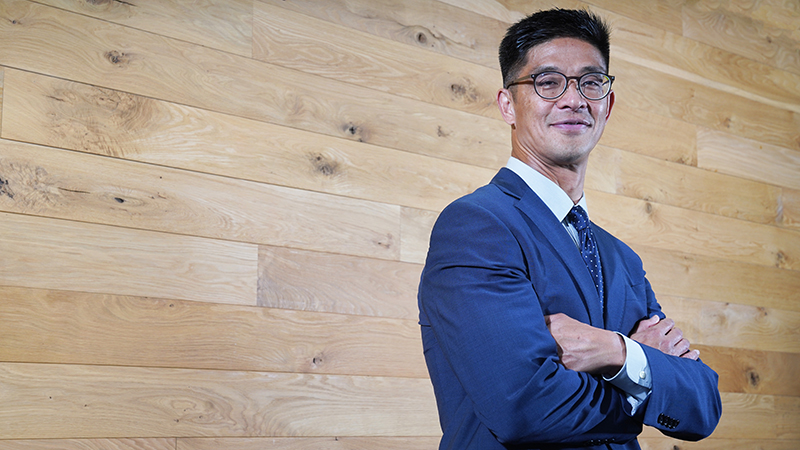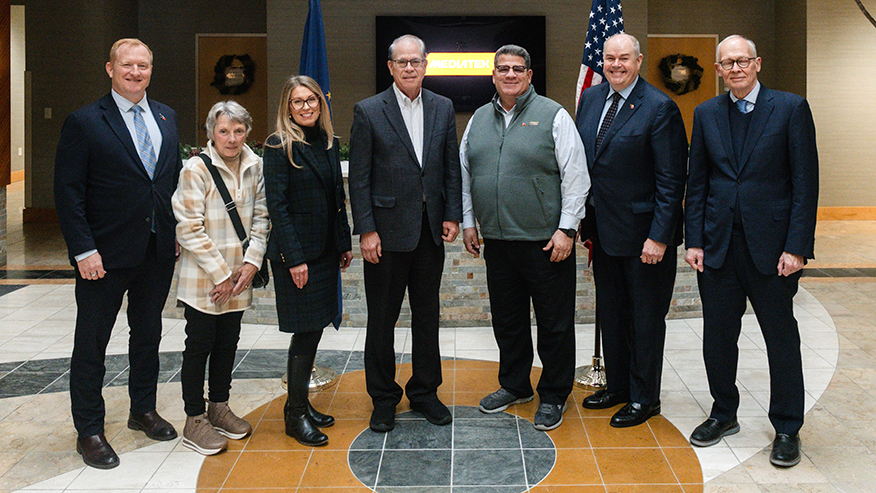I-O psychology program pushes boundaries of science, equipping graduates for challenging professional careers in industry, academia
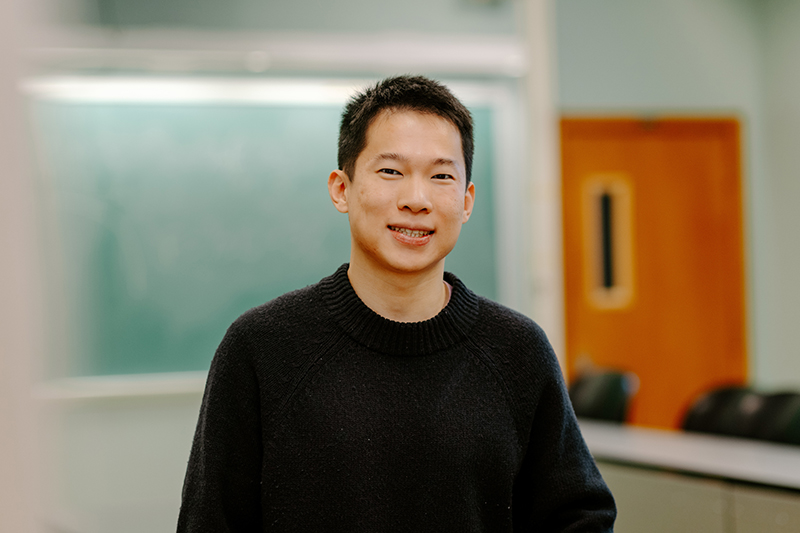
Rick Yang hopes to pursue a career in academia after he completes his doctoral studies in Purdue’s industrial and organizational psychology program. While he knew about the program’s strengths, reputation and national ranking, Yang has been impressed by the depth and breadth of the scholarship and collaborative spirit of the Purdue faculty and fellow doctoral students. (Purdue University photo/Kelsey Lefever)
Rick Yang launched his doctoral studies in Purdue University’s industrial and organizational psychology program in 2020, examining how people perceive and navigate goals, conflict, diversity and inclusion.
Going in, Yang knew about the program’s strengths, reputation and national ranking. Nearly four years into his studies, he marvels at the research by his colleagues in the Department of Psychological Sciences program, how they’re pushing the boundaries of science, their impact on real-world problems, the depth and breadth of the multidisciplinary efforts, and the collaborative culture of the faculty.
“Through my interactions with faculty and students here before I chose the program, I learned that they were not only brilliant scholars but also kind individuals who care about each other and people in the community,” says Yang, who is originally from China. “It turned out that the supportive environment created by the people here really made a difference in my graduate school experience.”
Ranked tied for No. 7 by U.S. News & World Report in its most recent survey of specialty programs for graduate students in 2022, Purdue’s industrial and organizational (I-O) psychology program is one of the nation’s best — and oldest. It also has graduated more PhDs and produced more Society of Industrial and Organizational Psychology (SIOP) fellows than any other program.
“Purdue’s industrial-organizational psychology program is one of the nation’s most storied programs, having conferred its first degree in 1939,” says Kimberly Kinzig, professor and interim head of the Department of Psychological Sciences. “The Purdue I-O faculty maintains this reputation with high levels of research, grant activity and leadership in the field, with a focus on inclusive mentoring to help our students reach their full potential.”
Additional Information
The program in the College of Health and Human Sciences claimed that lofty status long before the heroics of one of its most famous alums cast the program into an even brighter spotlight.
Chesley “Sully” Sullenberger, who earned a master’s degree in industrial psychology from Purdue in 1973, became the “Hero on the Hudson” on Jan. 15, 2009, when just after takeoff from New York’s LaGuardia Airport, a flock of geese took out both engines on his US Airways airliner. Sullenberger landed the plane safely on the Hudson River and stayed on board until all 155 passengers and crew members were safely off the plane.

Purdue’s I-O program helps prepare graduate students for careers in academia as well as government, industry and consulting firms. In general, I-O psychology is the study of the psychology of work and working. Those in this field use research on the psychology of work to help organizations be more effective and improve the quality of work.
“Purdue’s I-O psychology program is a leader in the areas of AI and Big Data, diversity science and well-being,” says Louis Tay, the William C. Byham Professor of Psychological Sciences. “We contribute to the evaluation of algorithms applied to organizational selection, promoting multiple goals and identities within the workplace, and addressing organizational and national policies on fostering worker well-being.”
Recent graduates are all well placed in academia — Virginia Tech, George Mason and North Carolina State universities, for example — and at major companies such as Google, consumer goods giant Procter & Gamble and personality assessment consulting firm Hogan Assessments, says Sang Eun Woo, industrial-organizational psychology professor and director of the Purdue’s Susan Bulkeley Butler Center for Leadership Excellence.
“Purdue I-O also is the first I-O program that joined the United Nations’ Global Compact to advance evidence-based knowledge for organizations to make positive humanitarian impacts through increasing sustainability, accessibility and equity in our society,” Professor Woo adds.

Franki Kung, an assistant professor of psychological sciences, recently was awarded an NSF Early Career Award on the topic of Asian dehumanization and ways to create a more inclusive workforce.
In the last five years, Purdue’s I-O faculty have collectively led and produced six edited books on the topics of well-being, technology and artificial intelligence, which have been published by the American Psychological Association, Oxford University Press and Cambridge University Press.
Louis Hickman graduated from the Purdue program in 2021 and started a postdoctoral position in the Wharton School’s people analytics program at the University of Pennsylvania before becoming an assistant professor of I-O psychology at Virginia Tech University.
“Purdue’s I-O psychology PhD program transformed my life. The program is run by great, supportive professors who are interested in student success,” Hickman says. “The methodological and substantive training they provide enabled me to start my own stream of research that is still carrying me forward. The Purdue program has great people, offering a great opportunity for anyone who gets to study with them.”
Through Purdue’s program, graduate students are admitted to work alongside a primary faculty member who will serve as their mentor. Heavily research-oriented, graduate training is based on a science-practice model, so students are trained as both researchers and applied scientists, equipped to work with organizations on human resources-related issues. Graduate students also have opportunities to gain teaching experience in the program.
All graduate students are admitted with funding and will have guaranteed funding for five years, provided they are making good progress toward their PhD. An admitted student will typically work as a graduate teaching assistant for 20 hours per week during the academic year and receive a nine-month stipend and tuition waiver.
Celebrated Purdue alum Sullenberger and other experts have credited his background in psychology as one of the reasons he was able to respond well to the aviation emergency. In his book, “Highest Duty: My Search for What Really Matters,” Sullenberger writes that his study prepared him well for the challenges he would face. Sullenberger also majored in psychology and basic sciences as an undergraduate at the U.S. Air Force Academy.
“At Purdue, I studied how machines and systems should be designed,” Sullenberger writes. “How do engineers create cockpit configurations and instrument-panel layouts taking into account where pilots might place their hands or where eyes might focus, or what items might be a distraction? I believed learning these things could have applications for me down the road, and I was right. In my later years, as I focused on airline safety issues, I realized how much my formal education allowed me to view the world in ways that helped me set priorities, so I understood the why as well as the how.”
Yang, who aspires to go into academia once he completes his PhD from Purdue, says when people first hear of I-O psychology, most incorrectly assume the discipline “ultimately serves organizations to help them make more profits.” At Purdue, though, the program has a long tradition of studying person-centric work psychology, focusing on human beings at work and even beyond work.
“Many of us try to understand the subjective experience of working and aim to improve the well-being of workers. I really appreciate this academic orientation,” he says. “With the training in this program, I hope to become a well-rounded scholar to conduct and lead research programs that are rigorous and meaningful to the world. As a psychologist, I hope to help people thrive in the world as my ultimate goal.”
Media contact: Phillip Fiorini, pfiorini@purdue.edu
